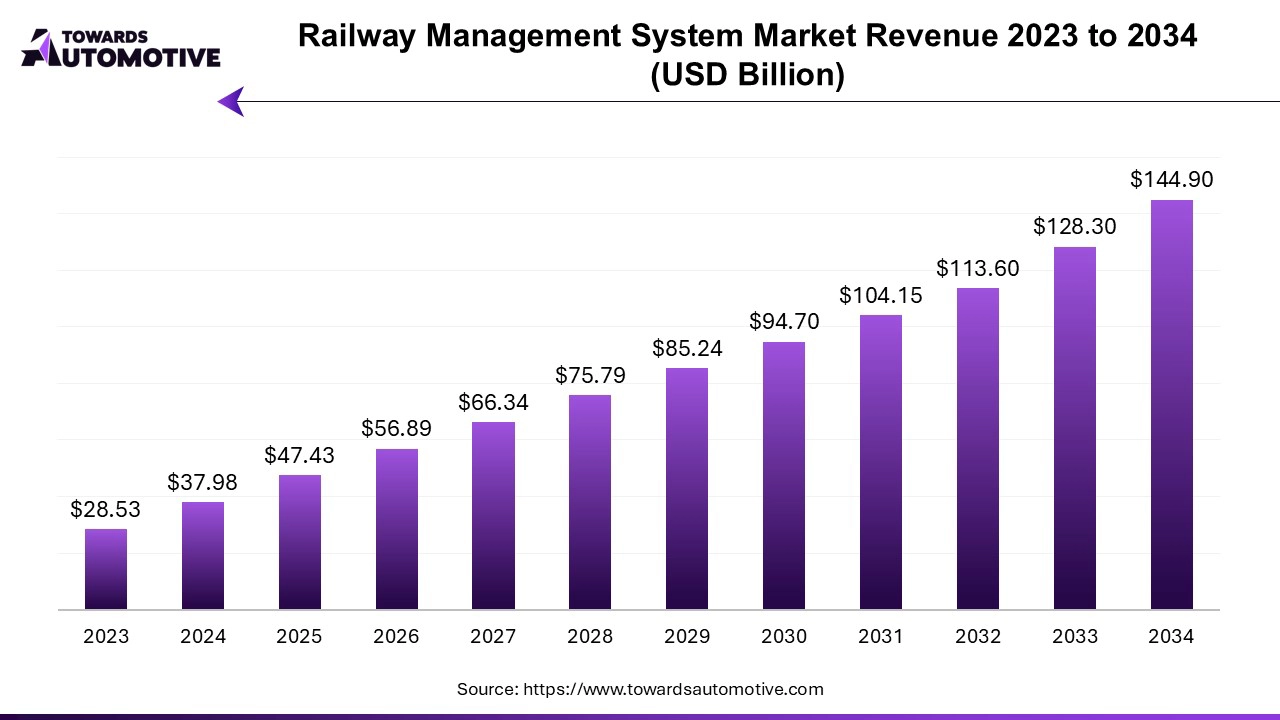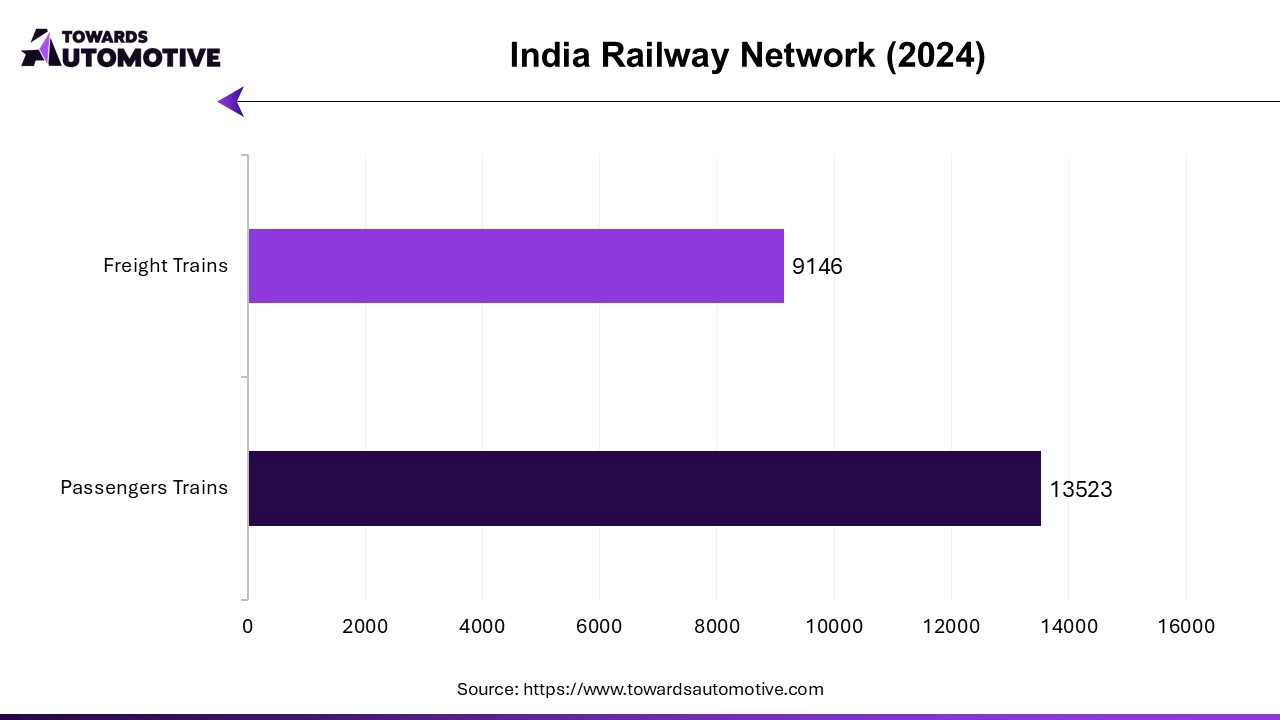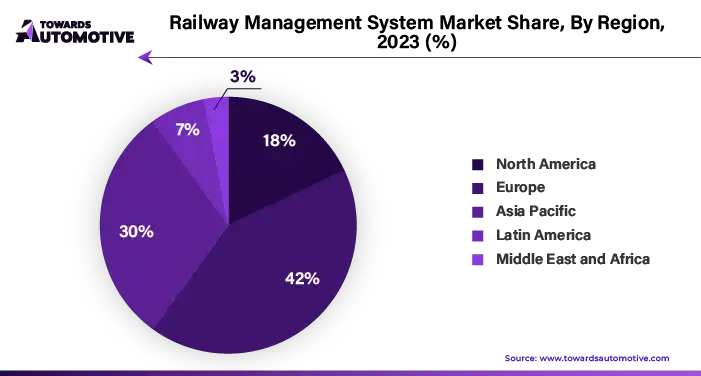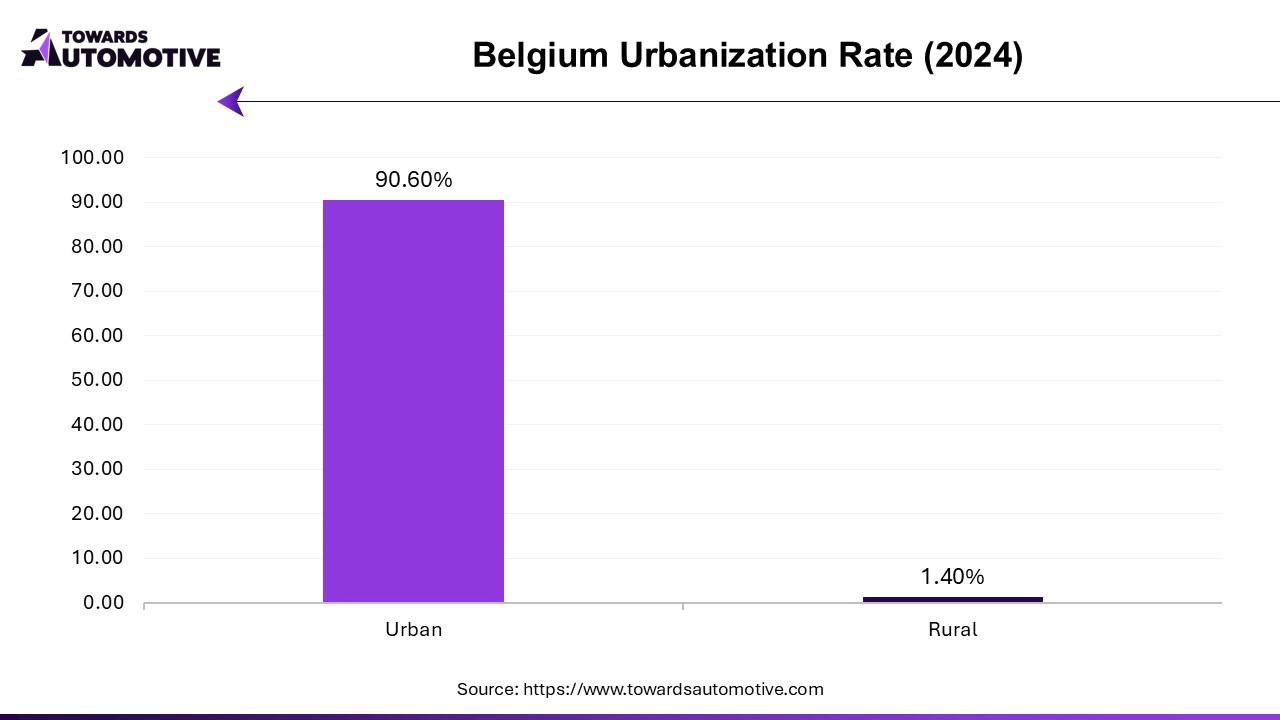April 2025
The railway management system market is forecasted to expand from USD 47.43 billion in 2025 to USD 144.90 billion by 2034, growing at a CAGR of 12.94% from 2025 to 2034.

Unlock Infinite Advantages: Subscribe to Annual Membership
The railway management system market is experiencing significant growth as rail transport becomes increasingly vital for sustainable and efficient logistics and passenger travel. This market encompasses a range of technologies designed to optimize the operation and management of rail networks, including ticketing systems, scheduling, fleet management, and asset monitoring solutions. With the rising demand for efficient transportation, rail operators are adopting advanced railway management systems that leverage Internet of Things (IoT) technology, big data analytics, and artificial intelligence (AI) to enhance operational efficiency and safety.
These systems improve train scheduling, reduce delays, and provide real-time updates to passengers, significantly enhancing the overall travel experience. Additionally, the push for sustainable transportation solutions is driving investments in electrified rail networks and automated systems, further expanding the scope of the railway management system market.
Government initiatives aimed at modernizing rail infrastructure and promoting public transport also contribute to this growth, as countries strive to meet increasing urbanization and environmental challenges. As rail systems worldwide adopt digital transformation, the railway management system market is set to evolve rapidly, providing innovative solutions that enhance operational effectiveness and customer satisfaction while supporting sustainable mobility initiatives.
Artificial Intelligence (AI) plays a transformative role in the Railway Management System Market, enhancing operational efficiency, safety, and customer experience. By leveraging advanced algorithms and machine learning, AI systems analyze vast amounts of data from various sources, including train schedules, passenger flows, and environmental conditions. This analysis enables predictive maintenance, where potential issues with trains or infrastructure can be identified before they lead to failures, thereby reducing downtime and operational costs.
AI also optimizes train scheduling and routing, allowing for real-time adjustments based on traffic patterns, delays, and passenger demand. This ensures more efficient use of resources and helps minimize delays, improving overall service reliability. In addition, AI-driven analytics provide valuable insights into passenger behavior, enabling railway operators to tailor services and enhance customer experiences, such as personalized travel recommendations and dynamic pricing models.
Moreover, AI enhances safety by enabling automatic train control systems that can detect obstacles, signal changes, and other critical safety measures, reducing the risk of accidents. With the increasing adoption of smart technologies and the Internet of Things (IoT) in rail systems, AI's role in the Railway Management System Market is expected to grow, driving innovations that enhance the efficiency and sustainability of rail transport.
In June 2024, ADComms launched MonicaHub. It is an AI-based intelligent connected software system that enhances the railway management system.
The expansion of railway networks worldwide is a key driver of growth in the railway management system market. As countries invest in infrastructure to improve connectivity, reduce traffic congestion, and promote sustainable transportation, the demand for advanced railway management systems rises. These systems play a crucial role in optimizing operations, ensuring efficient train scheduling, managing traffic, and enhancing safety protocols. Emerging economies, especially in regions like Asia-Pacific, are seeing massive railway expansions, both for freight and passenger transport. Additionally, urbanization and population growth are pushing governments to invest in high-speed rail and metro systems, further boosting the need for sophisticated management solutions.
Railway networks are also expanding to support international trade, particularly in regions like Europe and Asia where cross-border rail freight is increasing. This growth demands seamless coordination and integration, making robust railway management systems essential for tracking, real-time monitoring, and communication across borders. Advanced technologies such as AI, IoT, and cloud computing are integrated into these systems to enhance overall efficiency and minimize delays. As railway infrastructure grows and modernizes, the market for management systems will continue to expand, offering solutions that support scalable, safe, and efficient railway operations globally.

The railway management system market faces several restraints that could limit its growth. High initial investment costs for implementing advanced technologies like automation, cloud integration, and smart traffic management systems are a significant barrier. Additionally, existing infrastructure in many regions is outdated, making modernization complex and expensive. The lengthy approval processes and regulatory challenges for railway expansion projects further hinder the market's development. Furthermore, the lack of skilled personnel to manage and maintain advanced systems can slow adoption, while cybersecurity concerns surrounding the digitalization of railways pose additional challenges for industry growth.
Sustainable transportation solutions are creating significant opportunities in the railway management system market by driving innovation and the adoption of eco-friendly practices. As governments and industries worldwide focus on reducing carbon emissions, railways are emerging as a crucial mode of green transportation. Railway systems, known for their energy efficiency and lower environmental impact compared to road and air transport, are increasingly being integrated with sustainable technologies. This shift includes the electrification of rail networks, which reduces dependence on fossil fuels and minimizes carbon emissions.
Additionally, energy-efficient railway management systems that optimize train scheduling, reduce idle times, and enhance fuel efficiency are gaining prominence. The implementation of smart grid technologies to manage energy consumption within railway networks is further promoting sustainability. By improving the efficiency of trains and infrastructure, these systems contribute to lower energy costs and a smaller carbon footprint.
The focus on sustainable transportation is also spurring the adoption of renewable energy sources, such as solar and wind power, to electrify trains and railway stations. This transition supports the goals of reducing emissions and dependency on non-renewable resources. As a result, companies offering green solutions in railway management systems are finding new growth opportunities, with increased investment in eco-friendly infrastructure and technologies becoming a priority across the globe.
The system integration segment held the largest share of the market. The system integration segment plays a crucial role in driving the growth of the Railway Management System Market by enabling seamless interoperability between various components of railway operations. As railways adopt advanced technologies such as Internet of Things (IoT), artificial intelligence (AI), and big data analytics, the need for integrated systems becomes increasingly vital. System integration facilitates the consolidation of disparate systems, such as ticketing, scheduling, fleet management, and maintenance, into a cohesive framework that enhances operational efficiency.
By ensuring that these systems communicate effectively, operators can optimize train scheduling, reduce delays, and improve overall service reliability. Furthermore, integrated systems enhance data sharing and real-time monitoring, allowing for proactive decision-making and predictive maintenance. This not only minimizes disruptions but also extends the lifespan of assets and reduces operational costs. The growing focus on improving passenger experience through personalized services and real-time information is also supported by effective system integration.
Additionally, with governments investing heavily in modernizing rail infrastructure and pushing for smarter transport solutions, the demand for integrated railway management systems is set to rise. Consequently, the system integration segment is pivotal in transforming railway operations, driving innovation, and contributing to the overall growth of the Railway Management System Market.
The cloud segment led the industry. The cloud segment significantly drives the growth of the Railway Management System Market by providing scalable, flexible, and cost-effective solutions for managing complex railway operations. Cloud technology allows railway operators to access real-time data and analytics from anywhere, facilitating better decision-making and enhancing operational efficiency. By leveraging cloud-based systems, railway companies can integrate various functions such as ticketing, scheduling, asset management, and customer relationship management into a unified platform, streamlining processes and reducing redundancy.
Moreover, the cloud enables seamless data sharing and collaboration among different stakeholders, including operators, maintenance teams, and regulatory authorities. This connectivity enhances communication and ensures that all parties have access to the most up-to-date information, improving responsiveness to operational challenges. Additionally, cloud solutions offer advanced analytics capabilities, allowing for predictive maintenance and demand forecasting, which can help reduce downtime and optimize resource allocation.
With the increasing adoption of smart technologies in the rail sector, the cloud segment is also essential for supporting innovations such as Internet of Things (IoT) applications, enabling better monitoring of assets and environmental conditions. As railway operators seek to modernize their infrastructure and improve passenger experiences, the cloud segment will continue to be a key driver of growth in the Railway Management System Market, providing the agility and scalability needed for future advancements.
The rail traffic management system segment dominated the industry. The rail traffic management system segment plays a pivotal role in driving the growth of the Railway Management System Market by enhancing the efficiency and safety of rail operations. As rail networks expand and the demand for freight and passenger transport increases, effective traffic management becomes crucial. These systems utilize advanced technologies such as real-time data analytics, artificial intelligence (AI), and automated signaling to monitor and control train movements across the network, significantly reducing the risk of collisions and delays.
By optimizing train schedules and routes, rail traffic management systems improve overall operational efficiency, enabling railway operators to maximize the utilization of their assets while minimizing disruptions. This optimization also leads to enhanced punctuality, which is critical for maintaining customer satisfaction in both freight and passenger services. Furthermore, the integration of rail traffic management systems with other railway management solutions, such as ticketing and maintenance, creates a holistic approach to operations, allowing for better resource allocation and data-driven decision-making.
As governments and private operators invest in modernizing rail infrastructure to meet growing transportation demands, the rail traffic management system segment is positioned for substantial growth. With the increasing emphasis on safety, efficiency, and sustainability in the railway industry, this segment will continue to be a key driver in advancing the Railway Management System Market.

Asia Pacific dominated the railway management system market. The growth of the Railway Management System Market in the Asia-Pacific (APAC) region is significantly driven by the expanding railway network, increasing freight transport demand, and a heightened focus on sustainable transportation. Governments across APAC are investing heavily in railway infrastructure development to enhance connectivity and reduce congestion on roads. This expansion not only facilitates better passenger mobility but also paves the way for efficient freight transport, meeting the rising demand from industries seeking reliable logistics solutions. The surge in e-commerce and industrial activities is further propelling the need for sophisticated railway management systems that can optimize scheduling, improve cargo tracking, and enhance overall operational efficiency. Moreover, there is a strong emphasis on sustainable transportation in APAC, with countries recognizing the environmental benefits of railways over road transport. Railway management systems that incorporate green technologies, energy-efficient operations, and reduced emissions align well with governmental policies aimed at combating climate change. As a result, the interplay of these factors fosters a favorable environment for the adoption of advanced railway management solutions, ultimately driving market growth in the region.
Europe is expected to grow with a significant CAGR during the forecast period. The growth of the Railway Management System Market in Europe is significantly influenced by cross-border connectivity, rapid urbanization, and increasing passenger demand. European nations are focusing on enhancing cross-border rail networks to facilitate seamless travel and trade between countries. This initiative not only promotes economic growth but also encourages the adoption of integrated railway management systems that can handle diverse operational requirements across various jurisdictions. Additionally, rapid urbanization in major cities has led to heightened passenger demand for efficient and reliable public transport solutions. As urban populations grow, the need for advanced railway management systems becomes critical to ensure optimal scheduling, reduced delays, and improved safety. Furthermore, the European Union's commitment to sustainable transport and green initiatives amplifies the demand for smart railway management solutions that minimize environmental impact. By implementing state-of-the-art technologies, such as real-time monitoring and data analytics, railway operators can enhance service quality and operational efficiency, ultimately catering to the rising expectations of passengers.


By Solutions
By Service
By Deployment
By Region
April 2025
April 2025
April 2025
April 2025
Dr. Arjun Patel is a distinguished expert in the automotive industry, holding advanced degrees in Automotive Engineering and Mechanical Engineering. His expertise spans automotive market dynamics, technological advancements, and sustainable practices. Dr. Patel excels in conducting in depth research and analysis on market trends, consumer preferences, and the economic implications within the automotive sector. He is renowned for his insightful publications on topics such as electric vehicles, autonomous driving technologies, and the evolution of sustainable transportation solutions. Dr. Patels research contributions have significantly advanced understanding in the field, earning him recognition as a leading authority in automotive research and analysis.
We offer automotive expertise for market projections and customizable research, adaptable to diverse strategic approaches.
Contact Us